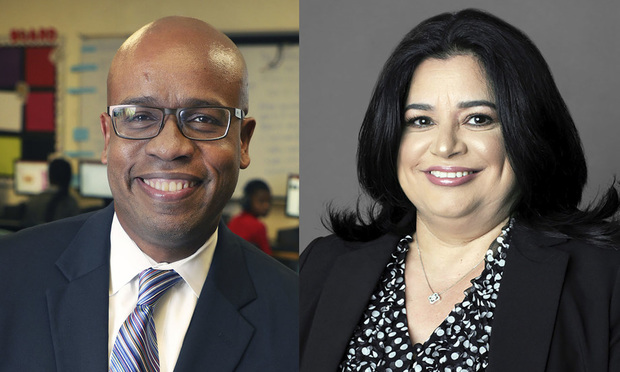Facing Diversity Pressure, the Legal Profession Is Still Debating Itself
The value of diversity in hiring and promotions is still up for debate in the legal profession even with corporate counsel promising to spend their money on outside law firms that better reflect demographics.
March 22, 2019 at 02:33 PM
5 minute read
 Marlon Hill, left, and Myrna Maysonet. Courtesy photos
Marlon Hill, left, and Myrna Maysonet. Courtesy photos
As corporate counsel clamor for greater diversity on their outside legal teams, legal professionals in general are still debating the need for making it a priority in recruiting, hiring and promotions.
The same issues apply to judicial appointments. Gov. Ron DeSantis chose three Florida Supreme Court justices this year, adding two Hispanic justices but leaving the court without an African-American justice for the first time in 36 years.
In an online Daily Business Review survey, just half of respondents said their employer prioritizes diversity. South Florida legal professionals responding to the survey, which also ran in other large states, were the least likely to say diversity is a priority at their organization or a plus for promotions.
Diversity in law, like in other professions, can be a prickly subject. In response to open-ended questions in the Daily Business Review survey on diversity strategies and employer policies, one anonymous response said: “Select best people irrespective of diversity. Anything else is racist.”
Interviewed about the results, Myrna Maysonet, the newly appointed chief diversity officer at Greenspoon Marder, said clients are better served by diverse perspectives in race and ethnicity, gender and sexual orientation.
“In a perfect world, you would be able to measure everyone apples to apples,” she said. “To say that you can go blindly into things, that works very, very seldom.”
The results might come as a surprise in a region with such a large minority population. Based on 2017 census estimates, more than half of Miami-Dade County residents are foreign-born, and two-thirds of the population is Hispanic. The foreign-born rate is one-third in Broward County and one-quarter in Palm Beach County.
Marlon Hill, a partner at the 45-attorney Hamilton, Miller & Birthisel law firm in Miami, isn't surprised that the legal profession lags behind the population on diversity.
“Our diversity statistics in population are not in sync with our actual reality of executive and equity leadership,” he noted. “I believe there will be some level of complacency for diversity efforts in a minority-majority region.”
Sensitivity to South Florida's diversity might have played a role in the DBR survey, which is unscientific and disposed to attract responses from people interested in the subject. The anonymous survey generated 15 responses in Florida.
Overall, 51 percent of Florida respondents said their organizations prioritize diversity compared with 64 percent of all respondents in Texas, Pennsylvania and Connecticut. In Florida, only 33 percent saw recognition of diversity for promotions at their organizations compared with 37 percent overall. At 47 percent, Florida was in the middle of the states on whether diversity was more window dressing than reality for their employer compared with 43 percent overall.
One respondent saw no diversity strategy at the firm and added, “To be truthful, I do not recall ever seeing any information regarding this firm's diversity policy.”
Asked what strategies work to improve diversity, mentoring was the most common response, and readers mentioned recruiting, meaningful assignments, diverse leadership and a professional pipeline as well.
At Hill's firm, 51 percent of partners are women, and the firm's ethnic diversity is tied in part to its Caribbean focus. Its web page displaying attorney photos looks like an ad-agency vision of diversity.
“It's diversity at every level. It impacts our bottom line because clients appreciate it, they value it, and we get a lot of joy from it,” he said.
The firm has partnered with the 99 percent minority middle school in Miami's Brownsville neighborhood to introduce the legal profession as a career option and show opportunities for minorities don't begin at law school.
“Diversity doesn't just walk up to your door,” Hill said. “It is the responsibility of the management of a firm to strategically articulate its vision for diversity and to put in place the recommendations or the policies that will activate that intention.”
Maysonet joined her firm in 2000, became its first female partner and is trying to shrink its attorney gender gap. One-third are women. As diversity officer, she stressed the importance of action over words and the hazards of tokenism.
“Diversity is not just checking the boxes,” she said. “If you don't see people like you, you're not going to tend to believe that they have a diversity policy.”
For Hill, there's no question that cultural competence drives success for law firms in trials and in boardrooms.
“There's just so many things that diversity brings to the table that many people just overlook because they're in the bubble,” he said. “In a multicultural world like ours, you can't be in the bubble.”
Read more:
There's A Diversity Problem At Law Firms — What Can Be Done?
Greenspoon Marder Appoints a Chief Diversity Officer
Former Greenberg President Hilarie Bass Launches Diversity Institute
Judicial Shame: Return of The Dark Ages
This content has been archived. It is available through our partners, LexisNexis® and Bloomberg Law.
To view this content, please continue to their sites.
Not a Lexis Subscriber?
Subscribe Now
Not a Bloomberg Law Subscriber?
Subscribe Now
NOT FOR REPRINT
© 2025 ALM Global, LLC, All Rights Reserved. Request academic re-use from www.copyright.com. All other uses, submit a request to [email protected]. For more information visit Asset & Logo Licensing.
You Might Like
View All
Saul Ewing Loses Two Partners to Fox Rothschild, Marking Four Fla. Partner Exits in Last 13 Months
3 minute read
Calif. Fires Should Serve as a Reminder to Fla.’s Commercial Landlords and Tenants Not to Be Complacent
6 minute read
The Hidden Risks and Benefits of Investing in a Condo-Hotel or Branded Condominium Unit
9 minute readTrending Stories
Who Got The Work
J. Brugh Lower of Gibbons has entered an appearance for industrial equipment supplier Devco Corporation in a pending trademark infringement lawsuit. The suit, accusing the defendant of selling knock-off Graco products, was filed Dec. 18 in New Jersey District Court by Rivkin Radler on behalf of Graco Inc. and Graco Minnesota. The case, assigned to U.S. District Judge Zahid N. Quraishi, is 3:24-cv-11294, Graco Inc. et al v. Devco Corporation.
Who Got The Work
Rebecca Maller-Stein and Kent A. Yalowitz of Arnold & Porter Kaye Scholer have entered their appearances for Hanaco Venture Capital and its executives, Lior Prosor and David Frankel, in a pending securities lawsuit. The action, filed on Dec. 24 in New York Southern District Court by Zell, Aron & Co. on behalf of Goldeneye Advisors, accuses the defendants of negligently and fraudulently managing the plaintiff's $1 million investment. The case, assigned to U.S. District Judge Vernon S. Broderick, is 1:24-cv-09918, Goldeneye Advisors, LLC v. Hanaco Venture Capital, Ltd. et al.
Who Got The Work
Attorneys from A&O Shearman has stepped in as defense counsel for Toronto-Dominion Bank and other defendants in a pending securities class action. The suit, filed Dec. 11 in New York Southern District Court by Bleichmar Fonti & Auld, accuses the defendants of concealing the bank's 'pervasive' deficiencies in regards to its compliance with the Bank Secrecy Act and the quality of its anti-money laundering controls. The case, assigned to U.S. District Judge Arun Subramanian, is 1:24-cv-09445, Gonzalez v. The Toronto-Dominion Bank et al.
Who Got The Work
Crown Castle International, a Pennsylvania company providing shared communications infrastructure, has turned to Luke D. Wolf of Gordon Rees Scully Mansukhani to fend off a pending breach-of-contract lawsuit. The court action, filed Nov. 25 in Michigan Eastern District Court by Hooper Hathaway PC on behalf of The Town Residences LLC, accuses Crown Castle of failing to transfer approximately $30,000 in utility payments from T-Mobile in breach of a roof-top lease and assignment agreement. The case, assigned to U.S. District Judge Susan K. Declercq, is 2:24-cv-13131, The Town Residences LLC v. T-Mobile US, Inc. et al.
Who Got The Work
Wilfred P. Coronato and Daniel M. Schwartz of McCarter & English have stepped in as defense counsel to Electrolux Home Products Inc. in a pending product liability lawsuit. The court action, filed Nov. 26 in New York Eastern District Court by Poulos Lopiccolo PC and Nagel Rice LLP on behalf of David Stern, alleges that the defendant's refrigerators’ drawers and shelving repeatedly break and fall apart within months after purchase. The case, assigned to U.S. District Judge Joan M. Azrack, is 2:24-cv-08204, Stern v. Electrolux Home Products, Inc.
Featured Firms
Law Offices of Gary Martin Hays & Associates, P.C.
(470) 294-1674
Law Offices of Mark E. Salomone
(857) 444-6468
Smith & Hassler
(713) 739-1250







